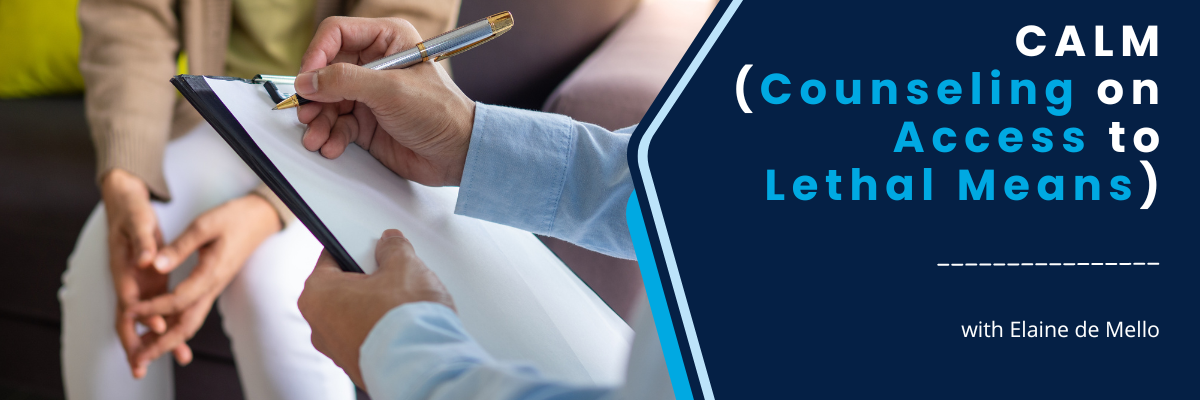
CALM (Counseling on Access to Lethal Means) - February 28, 2025
- Registration Closed
A 3.5-Hour Training with Elaine de Mello, LCSW
Virtual via Zoom | 8:30am-12:15pm
Presentation: Suicide is the second leading cause of death for young people ages 10 to 34 in New Hampshire and the eighth leading cause for those of all ages. We know that many attempters are as ambivalent about suicide as they are about life. Preventing these suicides is a very complex puzzle that requires all of us to work collaboratively to complete the picture. One piece of that puzzle that has proven to be effective is to reduce access to lethal means – particularly firearms and medications. This workshop addresses why and how to do this, focusing on the steps below. The workshop includes: power point presentations regarding why CALM is important, a model videotaped counseling session, plus time for discussion and role plays.
Four specific calm steps:
- Explain that you believe that the individual or a family member is at risk for suicide and why you have made this determination
- Explain that they can reduce the risk by reducing access to lethal means
- Discuss specific steps they can take to remove or at least reduce access to firearms, medications and other lethal means
- Make this part of a more comprehensive suicide prevention strategy
As a result of this training, participants will be able to:
- Explain the association between access to lethal means and the risk of suicide death and the contribution that reducing access to lethal means has on preventing suicide deaths;
- List at least 2 examples of skills, language and resources to collaboratively discuss reducing access to lethal means with individuals at risk for suicide and/or their families;
- Identify resources related to CALM; and
- Demonstrate skills, language and resources to collaboratively discuss reducing access to lethal means with individuals at risk for suicide and/or their families.
3.5 Contact Hours Available
CRSW Performance Domains: 1-4 (Suicide Prevention)
LADC/MLADC Categories of Competence: 1, 4-5 & 11-12 (Suicide Prevention)
Certified Prevention Specialist Domains: 2-3 & 6 (Suicide Prevention)
NBCC: LICSW/L-MFT/LCMHC (Category A) & Psychologist (Category A)
NH Alcohol & Drug Abuse Counselors Association has been approved by NBCC as an Approved Continuing Education Provider. ACEP No 6754. Programs that do not qualify for NBCC credit are clearly identified. NHADACA is solely responsible for all aspects of the program.
This training is financed under a contract with the State of NH, Department of Health and Human Services, with funds provided in part by the State of NH and/or such funding sources as were available or required, e.g., the United States Department of Health and Human Services.

Elaine de Mello
NAMI NH
Elaine de Mello, LCSW has worked in the mental health field since 1978. Elaine has worked with NAMI NH since 1999 where she had a lead role in the development of the Connect Suicide Prevention and Postvention Program, a national best practice. Elaine has provided training and consultation in mental health and suicide prevention throughout the United States and Canada in a variety of settings including state and tribal entities, community coalitions, schools and campuses, health care facilities, and military and paramilitary organizations. Elaine serves on the NH Suicide Fatality Review Committee and was the co-chair of the NH Youth Suicide Prevention Assembly from 2003-2024. She has also served on the national faculty for Zero Suicide.
